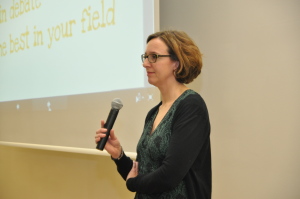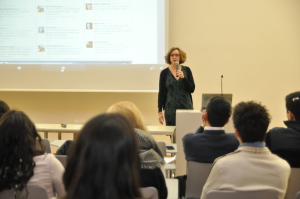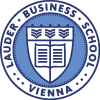Nadja Hahn Radio journalist at Austrian public broadcaster ORF
It is safe to say that many of us are over-facebooked these days. We post instant thoughts, share stories and tag each other in random snapshots. We constantly like and unlike statuses, and befriend people who we would hardly call friends offline. But how familiar are we with the opportunities social media offer for professional purposes? Do we know the benefits of LinkedIn? Are we able to launch an expert debate on Twitter? And, after all, how can one respond effectively to online shitstorms?
random snapshots. We constantly like and unlike statuses, and befriend people who we would hardly call friends offline. But how familiar are we with the opportunities social media offer for professional purposes? Do we know the benefits of LinkedIn? Are we able to launch an expert debate on Twitter? And, after all, how can one respond effectively to online shitstorms?
Nadja Hahn’s talk offered numerous extremely valuable insights into this field. Heading the social media activities of the Austrian public broadcaster ORF, Ms Hahn is at the forefront of exciting developments in corporate social media use. After graduating fromBostonUniversityand the London School of Economics, Nadja Hahn started her career as a finance reporter for Bloomberg News and the Financial Times. Since 2005, she has been a radio journalist at ORF’s economics news unit. Her outstanding expertise in media both old and new won her a European Broadcasting Union fellowship at the London School of Economics, where she studied how public broadcasters such as the BBC are using social media.
 Consequently, Ms Hahn’s approach to social media is primarily informed by the needs of journalists, which added fresh perspectives to the more marketing-oriented angle pursued in our business school. Three things are key for a professional user of social media: be up-to-date, stay organized and engage with your audience. Social media communication is reciprocal. What can be broadcast through traditional on-air channels prompts/requires lively debate on social media.
Consequently, Ms Hahn’s approach to social media is primarily informed by the needs of journalists, which added fresh perspectives to the more marketing-oriented angle pursued in our business school. Three things are key for a professional user of social media: be up-to-date, stay organized and engage with your audience. Social media communication is reciprocal. What can be broadcast through traditional on-air channels prompts/requires lively debate on social media.
According to Ms Hahn, authenticity raises attention and credibility. In other words, speak the language of your audience, share “human stuff” from your work reality, and let the community be part of creating content and shaping the message. Knowing your customers’ needs and your competitors’ edge will eventually improve your product. In a sense, social media can be employed as a marketing tool without actual marketing.
Ms Hahn’s advice on how to address mistakes was particularly compelling and much asked for in the Q&A session. The fast pace of social media spreads errors across the globe and makes them practically indelible. A versed user of social media will admit mistakes, explain, apologize and try to ameliorate. While refraining from sugar-coating, one should establish rules to avoid unpleasant outcomes, spot fakers, and always save screenshots. The above said only leads to success if organizations view social media as a managerial task which cannot be delegated to inexperienced staff.
By way of conclusion, the professional use of social media can create real value, if one knows the costs and benefits of different applications. And, to be sure, social media activity is public activity. Whether used responsibly or not, social media can be life-changing beyond the professional sphere.


Recent Comments